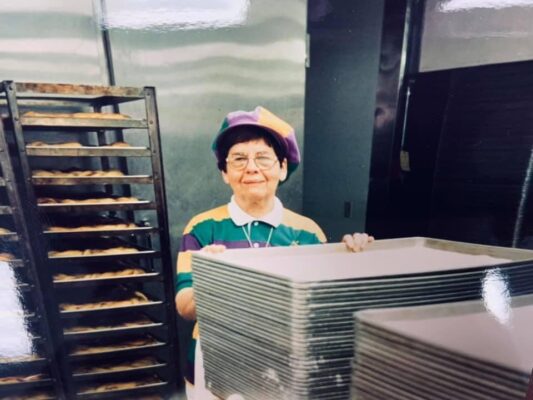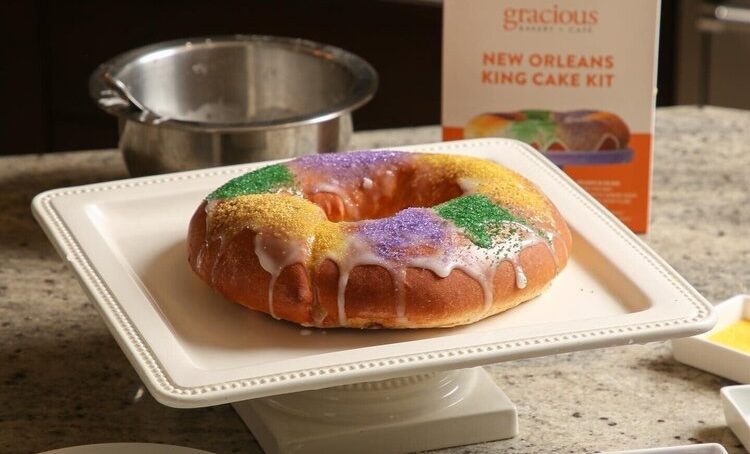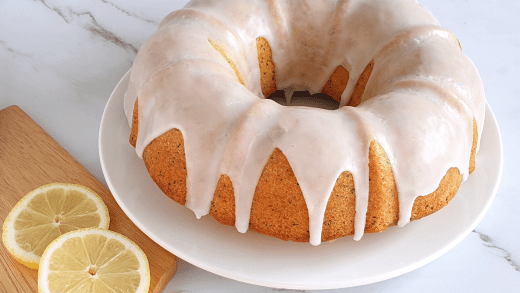During the Carnival season, there is no better way to celebrate Mardi Gras than with a traditional Louisiana king cake.
As the echoes of Santa’s sleigh fade away and the New Year settles in, Louisiana continues its festive spirit. Enter January 6, also known as Epiphany and Three Kings Day, marking the commencement of Carnival season and the delightful tradition of selling king cakes – a highly anticipated event in the Bayou State. It is a time for the Gulf Coast to eat, drink and be merry until the stroke of midnight on Mardi Gras or “Fat Tuesday,” when Lenten fasting begins. Until then, there is no better way to celebrate Mardi Gras than with a traditional Louisiana king cake.
“January 6 is the sacred date for selling king cakes,” shares pastry chef and proud Louisianian, Megan Forman.
Alongside her husband Jay, they own and operate Gracious Bakery and Café in the heart of New Orleans. “All bakeries here respect that and don’t start selling them beforehand. When the big day arrives, lines start forming around the block.”
The history of King’s Cake is as sweet as the confection itself.
According to Christian belief, Christ’s first appearance was to the “Three Wise Men” or “Three Kings.” Hence, king cakes are baked in a hollow oval shape to resemble jeweled crowns and pay homage to their namesake kings. Made from brioche, bread or danish dough, these cakes are then adorned with icing and sanding sugar in Mardi Gras hues of purple, green and gold – symbolizing justice, faith and prosperity.
Originating from France in the 1870s, the original king cakes were simple rings of almond-flavored dough. Over time, they evolved into signature creations, rich in real sugar, resembling a breakfast Danish. Today, bakeries around the Big Easy all offer their own spin on the classic recipe.
“Everyone has their own strongly held opinion about what makes a great king cake. However, there is a king cake for everyone,” Forman said. “There are so many versions in a wide variety of flavors.”
After Forman attended culinary school in Vermont and worked as a pastry chef in New York, the Formans returned to their home state in 2012 and opened their artisan bakery. From a small café, Gracious Bakery and Café expanded into a commissary and wholesale catering business with two bustling locations – one on St. Charles Avenue and the other on Prytania Street. Amidst a tempting array of pastries, bread, and desserts, king cakes reign supreme.
“The king cake season is the busiest and most profitable time of year for bakeries here,” she said. “The money made sustains everyone through the summer, which is much slower.”
When January 6 arrives, Forman and her team start making the 6,000 plus king cakes they will sell throughout the season.
“It takes two days to make a batch of king cakes,” Forman said. “We mix 300 pounds of dough at a time and then let it rest overnight in the refrigerators. Then we divide the dough, sheet it, and put the fillings in. After that we proof it, which is when the dough is allowed to rest and rise a final time. It then goes into the oven.”

Megan Forman, Photo courtesy of Gracious Bakery Instagram
Some bakeries divide king cake dough into three strands, braid them and shape the braid into an oval. Others, like Gracious Bakery, specialize in an unbraided style of cake.
“We make a variation on sweet dough that we shape into an oval and put various types of fillings in,” she said. “King cakes aren’t difficult to make, but it’s hard work because of the high volume of cakes we are producing.”
Sugar adds the magic finishing touch to the Bayou State king cake tradition.
Sugar, sourced from Gramercy, Louisiana, adds the magical finishing touch to the Bayou State king cake tradition. “We use Louisiana cane sugar in the dough and for icing and decorations. Various forms of inverted sugar enhance shelf life,” Forman said.
Carnival revelers are always looking for new trends in king cake, according to Forman. “Each bakery comes up with something totally unique each year. Cream cheese filling is always a favorite. We’ve also done Cherries Jubilee cakes and a hot pink nectar cream filling, which are a play on popular New Orleans flavors.”
Adding an element of surprise, each king cake conceals a small plastic baby, sparking anticipation and camaraderie among revelers. Some believe the baby represents the infant Jesus while others believe it is simply a symbol for luck and prosperity.
“Tradition says whoever finds the baby must buy the next king cake and keep the party going for family, friends, and coworkers,” she said.
The Formans and their team at Gracious Bakery and Café take pride in preserving New Orleans traditions. Forman said, “Mardi Gras brings out the best of our city. It’s a family event full of celebration and joy.”
King Cake, a Louisiana tradition that extends beyond the Bayou State.
Meanwhile, three generations of the Haydel family at Haydel’s Bakery in New Orleans made history on September 22, 2010, baking the world’s biggest king cake. The bakery created two giant king cakes, an outer cake and an inner cake, that wound around the Superdome. The colossal creation required 4,000 pounds of flour, 286 pounds of yeast, 428 dozen eggs, 299 pounds of cinnamon sugar, and 2,087 pounds of icing. The finished product, which was 5,300 feet long and weighed in at 8,688 pounds, broke two Guinness World Records and was officially proclaimed the World’s Largest King Cake – a testament to the global enthusiasm for king cakes.

Millie Haydel, Photo courtesy of Haydel’s Bakery Facebook
In an interview with Sam Irwin, author of “It Happens in Louisiana,” David Haydel, Sr., said the bakery overnight ships thousands of king cakes all over the U.S. and around the world during the Carnival season. “I enjoy making baked products because everything we do is a creation,” Haydel said. “You take pride in what you do.”
Embrace the vibrant spirit of Mardi Gras and the deep-rooted traditions of Louisiana, entwined with a fascinating two-century legacy of sugar cane harvesting in the Bayou State. Buy a traditional king cake to share with family and friends, learn to make the tasty treat with a convenient kit, or try your hand at making your own with real sugar, and “let the good times roll,” as they say in New Orleans.





Get Social with #MoreToSugar